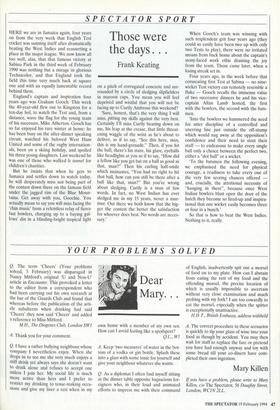SPECTATOR SPORT
Those were the days . . .
Frank Keating
HERE we are in Jamaica again, four years on from the very week that English Test cricket was sunning itself after dramatically beating the West Indies and reasserting a place in the major league. We now know all too well, alas, that that famous victory at Sabina Park in the third week of February 1990 was nothing but a mirage in glorious Technicolor, and that England took the field this time very much back at square one and with an equally lamentable record behind them.
England's captain and inspiration four years ago was Graham Gooch. This week the 40-year-old flew out to Kingston for a ten-day hol, to watch the Test and, from a distance, wave the flag for the young team of his successor, Mike Atherton. Gooch has so far enjoyed his rare winter at home: he has been busy on the after-dinner speaking circuit, watched his beloved West Ham United and some of the rugby internation- als, been on a skiing holiday, and spoiled his three young daughters. Last weekend he was one of those who walked le tunnel for children's charities.
But he insists that when he gets to Jamaica and settles down to watch today, he will desperately miss not being part of the contest down there on the famous field under the jagged rim of the Blue Moun- tains. Get away with you, Goochie. You actually mean to say you will miss facing the `chin music' from a relentless relay of fierce fast bowlers, charging up to a baying gal- lows' din in a blinding-bright tropical light on a pitch of corrugated concrete and sur- rounded by a circle of sledging slipfielders in maroon caps. You mean you will feel deprived and wistful that you will not be facing up to Curtly Ambrose this weekend?
`Sure, honest, that's the very thing I will miss, pitting my skills against the very best. Certainly I'll miss Curtly bearing down on me, his leap at the crease, that little threat- ening waggle of the wrist as he's about to deliver, as if to say, "See this here, man, this is my hand-grenade." Then, if you hit the ball, there's his stare, his glare, eyeballs like headlights at you as if to say, "How did a fellow like you get bat on a ball as good as that, man?" Then his curling half-smile which insinuates, "You had no right to hit that ball, how can you still be there after a ball like that, man?" But you're wrong about sledging. Curtly is a man of few words. In fact, no West Indian has ever sledged me in my 15 years, never a mur- mur. Out there we both know that the big- ger the contest the better the satisfaction for whoever does best. No words are neces- sary.' When Gooch's team was winning with such resplendent grit four years ago (they could so easily have been two up with only two Tests to play), there were no irritated moans from back home about the captain's stony-faced work ethic draining the joy from the team. Those came later, when a losing streak set in.
Four years ago, in the week before that coruscating first Test at Sabina — no nine- wicket Test victory can remotely resemble a fluke — Gooch recalls the immense value of two successive dinners he and his vice- captain Allan Lamb hosted, the first with the bowlers, the second with the bats- men.
`Into the bowlers we hammered the need for utter discipline of a controlled and unerring line just outside the off-stump which would nag away at the opposition's confidence and their need to strut their stuff — to endeavour to make every single ball only a choice between the perfect two, either a "dot ball" or a wicket.
`To the batsmen the following evening, we emphasised the need for physical courage, a readiness to take every one of the very few scoring chances offered and, crucially, the attritional necessity of "hanging in there", because once West Indian bowlers blast open the door of the hutch they become so fired-up and inspira- tional that one wicket easily becomes three or four in a bunch.'
So that is how to beat the West Indies. Nothing to it, really.


















































 Previous page
Previous page